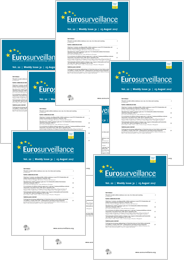- Home
- Weekly releases (1997–2007)
- Previous Issues
- Volume 7, Issue 6, 06/Feb/2003
Weekly releases (1997–2007) - Volume 7, Issue 6, 06 February 2003
Volume 7, Issue 6, 2003
- Articles
-
-
-
Lassa fever in a UK soldier recently returned from Sierra Leone - e-alert 10 February
More LessA case of Lassa fever has been confirmed in a British soldier returned from Sierra Leone, West Africa, it is reported in a press release issued today by the Royal Free Hampstead Hospital in London (1). The man, who became ill on 30 January, is being cared for at a high security infectious diseases unit in London and is in a stable condition.
-
-
-
WHO publishes guidance to minimise both terrorist and unintentional threats to food
More LessThe World Health Organization (WHO) has published guidance to help national governments minimise terrorist threats to food by integrating the mechanisms which manage outbreaks of both unintentional and deliberate foodborne diseases and contamination (1,2). The need for guidance was raised during the 55th World Health Assembly in May 2002, and Terrorist threats to food: guidance for establishing and strengthening prevention and response systems (www.who.int/fsf) is a response to recent increasing concern worldwide about the possible use of chemical, biological or radionuclear (CBRN) agents against civilian populations.
-
-
-
Large fall in new HIV diagnoses in Latvia in 2002
More LessThe World Health Organization (WHO) has published guidance to help national governments minimise terrorist threats to food by integrating the mechanisms which manage outbreaks of both unintentional and deliberate foodborne diseases and contamination (1,2). The need for guidance was raised during the 55th World Health Assembly in May 2002, and Terrorist threats to food: guidance for establishing and strengthening prevention and response systems (www.who.int/fsf) is a response to recent increasing concern worldwide about the possible use of chemical, biological or radionuclear (CBRN) agents against civilian populations.
-
-
-
The WHO European health for all database
More LessThe European health for all database provides easy and rapid access to a wide range of basic health statistics (indicators) for the 51 Member States of the World Health Organization (WHO) European Region. It was developed by the WHO Regional Office for Europe in the mid 1980s to support the monitoring of health trends in the Region. The database is a helpful tool for international comparison and for assessing the health situation and trends in any European country in an international context.
-
-
-
Training fellowships for intervention epidemiology in Europe: 9th cohort of EPIET starting October 2003
More LessThe European Programme for Intervention Epidemiology Training (EPIET) started in 1995. The programme is funded by the European Commission and by various European Union (EU) member states as well as Norway and the World Health Organization (WHO). Subject to agreement for another round of funding, the ninth cohort of fellows will start in October 2003. The programme invites applications for 10 fellowships for this 24 month training programme in communicable disease field epidemiology.
-
-
Most Read This Month

-
-
Chikungunya in north-eastern Italy: a summing up of the outbreak
R Angelini , A C Finarelli , P Angelini , C Po , K Petropulacos , G Silvi , P Macini , C Fortuna , G Venturi , F Magurano , C Fiorentini , A Marchi , E Benedetti , P Bucci , S Boros , R Romi , G Majori , M G Ciufolini , L Nicoletti , G Rezza and A Cassone
-
- More Less


